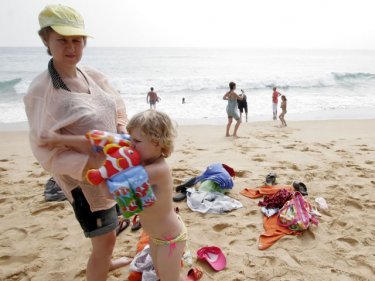The scene was on Karon beach yesterday, at the same spot where about 20 hours earlier, an Australian tourist had gone missing, and is now presumed drowned.
Proving fatal to tourists time and time again at Karon beach, Phuket's most dangerous, is the allure of sun, sand and surf.
The Australian tourist who took the plunge at dusk on Monday, Jennifer Laidley, 44, was the exception. She knew it was risky, but decided to swim anyway.
Most of those lost in the waves at Karon over the past few years have been non-English speakers, people who fail to read the warning signs and may not know that Phuket beaches can be deadly at the wrong time of year.
They also either ignore, misinterpret or fail to notice the red flags that dot Karon and other Phuket beaches when conditions are too turbulent for swimming.
The flags all carry messages in capital letters: DANGEROUS! STONG (sic) CURRENT NO SWIMMING HERE, with the same also written in Thai.
This monsoon season, signs in Russian have been added. Sadly, nothing on the beach seems to dissuade holidaymakers determined to swim on their Phuket holiday.
For the resorts nearby on Karon, the drownings represent a public relations disaster.
Some of them do the right thing and warn their guests on arrival, making sure that the message is delivered in person. Many new arrivals are disinclined to read brochures or pamphlets - there are too many commercial ones as well as serious ones.
Other resorts neglect to warn their guests, and they are the ones that the lifeguards think should be doing the right thing to save drownings. As with the disappearance of Jennifer Laidley, each new tragedy brings a surge of negative publicity.
''By the time that tourists go into the water on dangerous days, it's too late,'' says Phuket Lifeguard Club leader, Prathayut ''Nat'' Cheryon. ''If resorts could warn their guests every time someone arrives between April and November, more lives could be saved.''
Consideration is also being given to a message from the pilot or in video form as each flight descends to Phuket.










Prohibited swimming when sea is safe as on Phuketwan pictures or for a 6-month period from May until October is ridiculious as many tourists will not care about it.
It would be better to rise up the flag signal according of the day conditions and delimited some restricted areas with buoys for safe swimming with beach guards on duty.
Posted by Whistle-Blower on July 6, 2011 11:10